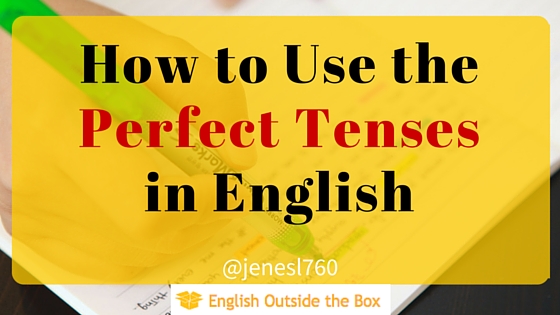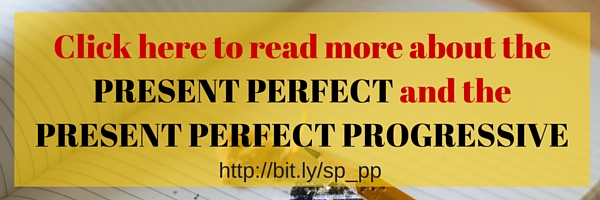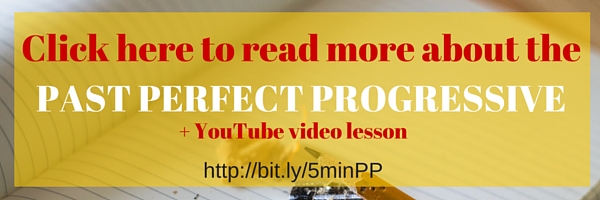
How to Use the Perfect Tense (s) in English
Ah, the perfect tenses. Many people would disagree that these tenses are not”perfect” because they actually cause a lot of confusion and difficulty with learning and understanding English.
However, they don’t need to be confusing and I am here today to help you understand each of the 6 perfect tenses. I will explain the structure, the use, and provide examples to help you get it. (*to “get it” means to understand it*)
Let’s jump right into it and look at some examples, so we can see the structure of these perfect tenses. We’ll begin with the [simple] perfect tenses, which means the NON -ing forms:
I have read that book. (present perfect)
The present perfect tenses use: has/have + past participle. The subject will determine if the auxiliary is “has” or “have” (EX: She has read that book. We have read that book. He has read that book.)
I had read that book when I started the class. (past perfect)
The past perfect tenses use: had + past participle.
I will have read that book by the time the semester finishes. (future perfect)
The future perfect tenses use: will + have + past participle. *The future “be going to” can also be used here; however, it is not as common because it is much longer than the simple “will”.
Now, let’s take a look and the perfect progressive/continuous tenses. (*Note: the words “progressive” and “continuous” mean the same thing in this grammar context).
I have been teaching English for almost 9 years.
The present perfect progressive tenses use: has/have +been + verb-ING. Again, the subject will determine if the auxiliary is “has” or “have” (EX: She has been teaching…. We have been teaching…… or He has been teaching…..)
I had been teaching English for almost 7 years when I started my business.
The past perfect progressive tenses use: had + been + verb-ING. The subject will determine if the auxiliary is “has” or “have” (EX: She has read that book. We have read that book. He has read that book.)
I will have been teaching English for almost 15 years by 2022.
The future perfect progressive tenses use: will + have +been + verb-ING. *The same note applies here for the use of “be going to.” While it is OK, it’s just not common because of its length.
So, WHY do we use the perfect tenses?
A basic explanation of the perfect tenses, is that they are used to show a RELATIONSHIP of time in the present, past, and/or future, and they help connect actions and events in time. Here are the explanations of each of the perfect tenses, explaining WHY we use them and what they tell us….
- The present perfect shows us experiences that we have because we completed an action in the past (non specific time). (EX: I have read that book –tells you I did the action sometime in the past, so the experience is true today.)
- The present perfect progressive connects past actions to the present. (EX: I have been teaching for almost 9 years — tells you I started teaching in the past, and am still doing it today.)
- The past perfect shows that an action was completed before another time or action in the past. Because it connects an event to another past event/past time, it’s common to see a simple past action/time expression (EX: I had read that book when I started the class – tells you that I completed the action/I finished reading the book before I started the class.)
- The past perfect progressive shows that an action was in progress/happening before another time or action in the past. Again, it’s common to have a time expression or another past event. (EX: I had been teaching English for almost 7 years when I started my business — tells you that I was already teaching (the action was happening) for almost 7 years before the later past action of starting my business)
- The future perfect tells you that an event will have been finished before another future time or event. This means that the action has not happened yet, but you want to tell someone that it will happen and you will complete the action before another future action. (EX: I will have read that book by the time the semester finishes — tells you that I have not finished the book now/yet, but I will finish it in the future, by the end of the class (which means no later than the end of the class).
- The future perfect progressive is similar to the future perfect, but it will tell you that something will be happening (or will have been happening) by a future time/action. This action could have started in the past, in the present, or the future, BUT this tense will tell you that an action will be continuing before a future time. (EX: I will have been teaching for almost 10 years by 2022 — tells you that I have not been teaching 1o years now, but 10 years of teaching will be happening by the future, the year 2022.)
Important Notes about Each
- The present perfect and present perfect progressive are NEVER used with a past time expression. This means you cannot use “last year”, “2 years ago”, “yesterday”, “in 1999”, etc.. with the present perfect and present perfect progressive. These tenses are ONLY used for non-specific past actions.
- The only exception is with the words “for” or “since” — I have been living here for 3 years. I have been living here since 2013.
- It is OK to use “had + had” in the past perfect if the verb “HAVE” is the main verb. Remember, for the past perfect you need to use “had + past participle” (I had worked as a waitress before teaching.– had worked). So, when “have” is the main verb you need to say: “I had had dinner before I went to bed.” –had had OR “I had had a dog when I got a cat.” — had had [[ had had may seem strange, but I promise it is OK!]]
- It’s important to include the 2nd action or time expression in a sentence with the past perfect and past perfect progressive to show the relationship of time. If you say, “I had read that book”, your listener won’t know when you read it, or why you used the past perfect tense. So it’s better to say, “I had read that book before the class started,” because you are then showing the relationship.
I posted this video challenge on my Instagram, asking which tense would be correct to indicate that I finished eating before my husband got home last night.
Because I am talking about an action that finished BEFORE another past action, I would need to use the past perfect, so the answer is: B) had + had
I had had dinner ….(by the time/when/before my husband got home last night).
More Practice
Write a sentence to answer the following questions in these hypothetical (imagined) situations. You will want to use 1 of the 6 perfect tenses. Some sample answers are below:
- You have not yet completed your master’s degree, but you will finish it in 5 days. You are applying for a new job and your employer asks, “Do you have a master’s degree?”
- Someone asks about your experiences traveling abroad. They want to know about the places you already visited, but they do not want to know when. They just want to know about the general experience. What do you say?
- You arrive to work late because you missed the bus and had to run 2 miles to your office. Your face is red, you’re sweating, and you’re out of breath and panting (*breathing hard/heavy*). Your colleague says, “What happened?”
- Your new neighbor just moved in yesterday. They want to know how long you have been in the apartment. What do you tell them?
- You will graduate from college next week and will immediately start working in your field of study. By 2017, what can you say about your experience in the field? (*Note: it’s now, 2016)
- You meet your friend Isabella and Oliver at a coffee shop. Isabella thought she introduced you to Oliver, but you met him before that at a Yoga class. Isabella says, “I am so happy I introduced you two!” What can you say?
ANSWERS to the questions above
Do not read these if you have not tried the above exercise on your own. First read the situations and try to make your own sentences.
- future perfect: “By the time I start working here, I will have received my master’s degree.” OR “No, I don’t have my master’s degree yet but I will have finished it by the end of the week.
- present perfect: “I have been to Europe and Australia.” OR “I have visited many countries in Europe, like France, Spain, Germany, and Italy.” OR “I have traveled to Australia.”
- past perfect progressive: “I had been running (before I arrived here)!”
- present perfect progressive or present perfect with the verb “live”: “I have been living here for 3 years.” OR “I have lived here for 3 years.” (live has the same meaning in the present perfect progressive and the present perfect)
- future perfect progressive: “I will have been working in the field for almost 1 year by 2017.
- past perfect: “I had already met Oliver when you introduced us. I had met him before that at Yoga.”
how did you do?
Do you have any questions about the information above? Are you confused about any of the topics? Please comment below and I’d love to try and help!
If you liked this article, please share it with a friend or colleague. You can use the share buttons below! Thank you for the love and support, and as always….




Thank you for these really!
I am challenged to teach Verb Tenses, especially the perfect tenses to my french students as much as they are challenged by the topic. Now I would really find it helpful if you can post more sample exercises for students. They would always want to be able to comfortably and conveniently use the tenses in the conversation. Thanks!
[…] Click here to get your perfect tenses lesson. […]
Jenes,
You are the one!!
These were the best lessons about perfect tenses I ever had!
Thank you very much!
[…] a 5 Minute English video. If you missed the previous lesson about the perfect tenses, you can read that here, or bookmark it to read […]